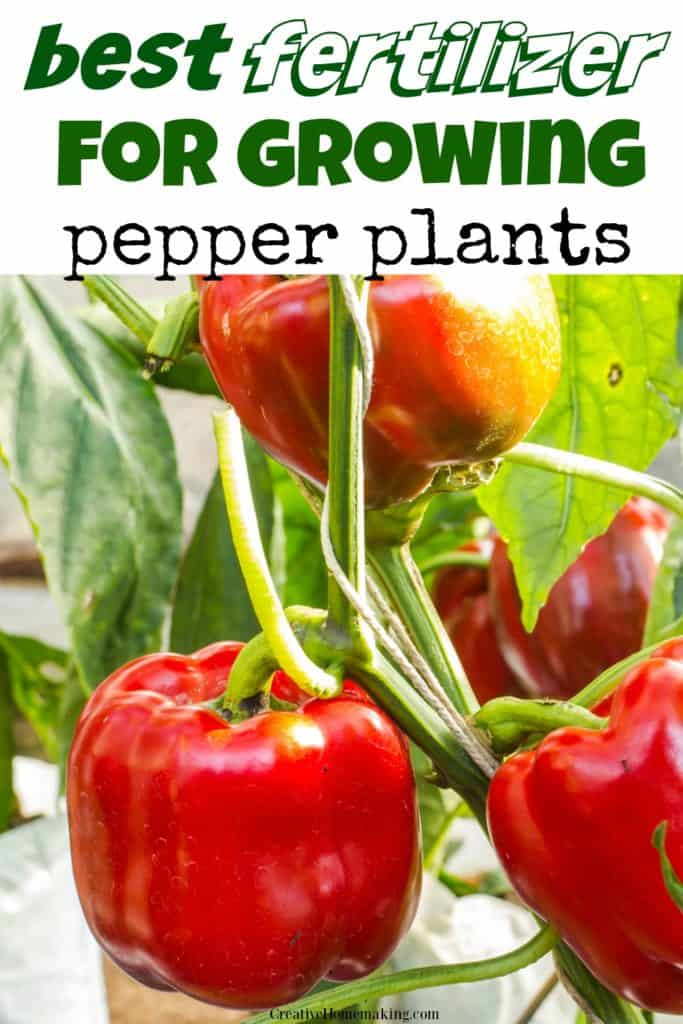Best Fertilizers for Peppers: Make Best Use Of Plant Health and Yield
Best Fertilizers for Peppers: Make Best Use Of Plant Health and Yield
Blog Article
Organic Vs. Synthetic Fertilizers: Which Is Best for Supporting Healthy And Balanced Pepper Plants?
In the world of supporting healthy and balanced pepper plants, the selection in between organic and artificial plant foods stands as an essential choice with far-ranging effects. While both alternatives objective to supply important nutrients to support plant growth, the nuances of their influence on the dirt, plant wellness, and the atmosphere trigger an argument that mirrors throughout the gardening neighborhood. Comprehending the distinctive benefits and potential mistakes of each plant food kind is critical for pepper growers seeking to optimize their yields while keeping an eco-conscious and sustainable technique.
Benefits of Organic Fertilizers
Organic plant foods supply a sustainable and environmentally-friendly strategy to beneficial pepper plants, offering necessary nutrients without using synthetic chemicals. These all-natural fertilizers are originated from organic resources such as compost, manure, bone meal, and seaweed, advertising soil health and biodiversity. Unlike artificial fertilizers, organic choices release nutrients slowly, making certain a well balanced and consistent supply for pepper plants to flourish.
One significant advantage of natural fertilizers is their capacity to boost dirt framework and water retention. By boosting dirt wellness, natural plant foods promote advantageous microbial task, which helps in nutrient uptake by pepper plants. In addition, organic fertilizers lower the threat of chemical run-off, shielding water resources from pollution and securing the environment.
In addition, organic plant foods add to long-lasting soil fertility by advertising the development of useful dirt microorganisms. These microorganisms assist break down natural issue, launching nutrients in a type that is conveniently available to pepper plants. best fertilizers for peppers. By fostering a healthy and balanced soil environment, natural plant foods sustain lasting pepper farming methods that profit both plants and the setting
Downsides of Synthetic Plant Foods
Artificial fertilizers, in contrast to their natural equivalents, present different disadvantages when utilized to nurture pepper plants, affecting both plant health and environmental sustainability. One significant downside of synthetic fertilizers is their propensity to seep nutrients from the soil swiftly.
Additionally, the overuse of synthetic fertilizers can add to water air pollution. Excess plant foods not taken in by plants can remove right into water bodies, resulting in eutrophication, where algae blossoms deplete oxygen degrees in the water, hurting marine life. Additionally, synthetic plant foods are normally acquired from non-renewable resources, such as fossil gas, contributing to carbon discharges and environmental destruction throughout their manufacturing.
Nutrient Absorption Contrast
Effective nutrient absorption plays a vital function in the total health and wellness and growth of pepper plants. When comparing natural and artificial fertilizers in terms of nutrient absorption, natural plant foods have the advantage of giving a more balanced and slow-release resource of nutrients (best fertilizers for peppers). Organic plant foods consist of a selection of macro and trace elements that are not only beneficial for the plants yet additionally promote healthy dirt microbial activity, which helps in nutrient uptake. On the other hand, synthetic plant foods typically provide a quick launch of nutrients, which can lead to seeping and drainage, leading to reduced nutrient absorption prices by the plants.
In addition, organic fertilizers enhance dirt structure and water retention capability, permitting pepper plants to gain access to nutrients much more successfully. This improved dirt top quality assists in root advancement, allowing much better nutrient absorption. Synthetic fertilizers, although originally improving plant growth due to their high nutrient focus, may impede lasting nutrient absorption by degrading dirt wellness gradually.
Environmental Impact Factors To Consider

On the various other hand, artificial fertilizers, although typically more focused and immediately offered to plants, can have detrimental effects on the environment otherwise applied properly (best fertilizers for peppers). Their manufacturing needs high energy inputs, resulting in greenhouse gas exhausts and adding to environment modification. Additionally, the overflow of excess synthetic fertilizers can infect water sources, resulting in eutrophication and harming marine communities.
Finest Fertilizer Practices for Peppers
When fertilizing pepper plants, optimizing nutrient uptake and decreasing environmental influence are crucial factors to consider. To attain this, it is crucial to comply with best plant food techniques customized to the specific needs of pepper plants. One crucial technique is to carry out a dirt test before using any type of fertilizers. This test can figure out the pH level of the dirt and determine any type of nutrient shortages, directing you in selecting the most appropriate plant food formulation.
An additional important method is to fertilize pepper plants at the correct time. Commonly, peppers benefit from receiving fertilizer at growing imp source and after that once again when they start to blossom. Over-fertilizing can result in vitamins and mineral imbalances and hurt the plants, so it is essential to adhere to advised application rates.
Additionally, choosing a well balanced plant food with an NPK proportion that suits pepper plants' requirements is basic. Organic fertilizers, such as compost or manure, can be outstanding selections as they launch nutrients slowly and improve soil structure with time. Synthetic fertilizers can offer a fast nutrient boost when required. Eventually, integrating synthetic and organic plant foods sensibly can help nurture healthy pepper plants while reducing environmental impact.
Conclusion

Organic fertilizers use an environmentally-friendly and sustainable technique to beneficial pepper plants, supplying important nutrients without the usage of synthetic chemicals. Unlike synthetic plant foods, natural options release nutrients gradually, making certain a well balanced and steady supply for pepper plants to grow.
Synthetic fertilizers, in comparison to their organic counterparts, present various disadvantages when utilized to nurture pepper plants, affecting both plant health and wellness and environmental sustainability. When contrasting natural and Learn More Here artificial plant foods in terms of nutrient absorption, organic fertilizers have the benefit of providing an extra balanced and slow-release source of nutrients.In addition, natural fertilizers enhance dirt structure and water retention capacity, enabling pepper plants to gain access to nutrients a lot more successfully.
Report this page